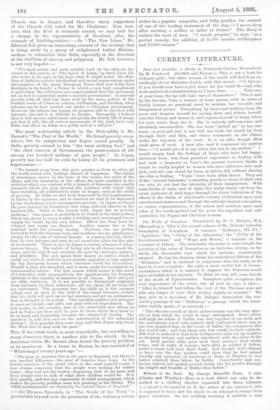CURRENT LITERATURE.
ceedingly clever character-sketch, with this moral 0 Sylvia if you should ever have a girl, never let her tread the road with
care. weak and trivial companionship as I have done
of your teens, the tys will take care of themselves." This is said by the heroine, Vera, a woman of some genius, with no sense of family honour, no practical creed to restrain her versatile and independent nature. Everything by turns and nothing long, she poses and despises herself for posing, flirts and abhors herself, uses her liberty and abuses it, and exposes herself to being taken for even worse than she is. She is entirely self-conscious and absolutely uncontrolled. She has been "picked up " by her con- trast,—a good girl who is not dull nor weak, but stands by Vera through thick and thin, and whose comments on the climax strike the key-note of the work. It is an able, though often crude piece of work. A man who read it expressed his opinion
thus :—" I would give it to my sister, but not to my mother." I would simply hurt the feelings of those who have led happy. sheltered lives ; but, from practical experience in dealing with just such a character as Vera's, the present reviewer thinks it would be really helpful to women who have influence with such girls, and who can stand by them, as Sylvia did, without sharing one idea or feeling. " Veras " have been often drawn. They are of the "eternal feminine," a standing puzzle to those of their own sex who do not feel the intensity of their temptations. With some faults of taste and of style, this study stands out from the usual portraits of such types through its clever indication of the effects of the limits of nineteenth-century civilisation upon such unrestrained natures, and through the entirely original conception, or rather representation, of the action and reaction upon each other of the world-spotted and the pure, the impulsive and self- controlled, the Pagan and Christian woman.


































 Previous page
Previous page